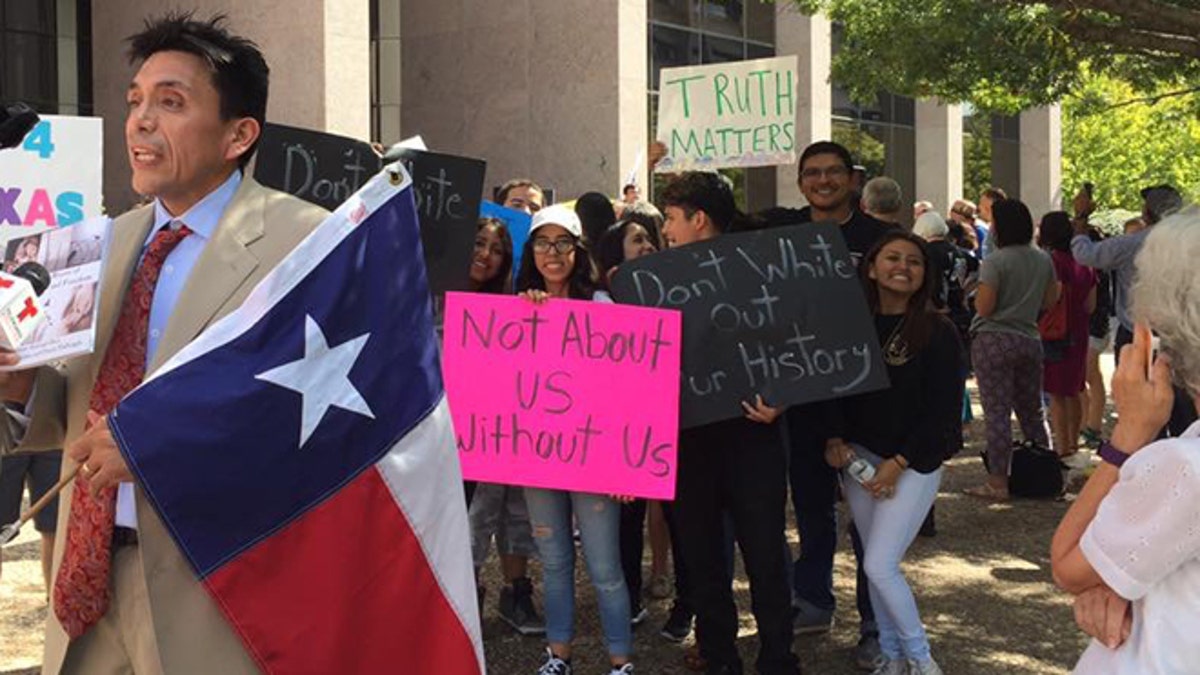
(Photo of Tony Diaz courtesy Lupe Mendez)
Hundreds of demonstrators gathered in Austin, Texas, to protest what they say is a “demeaning” and “insulting” Mexican-American studies textbook.
The Texas Board of Education is hearing testimony this evening on whether “Mexican-American Heritage” makes it into high school classrooms next year or not.
It’s a public hearing with more than 100 people speaking.
Two busloads of protesters arrived from Houston thanks to Tony Diaz, an activist who heads a group called the Librotraficantes – the "Book-Traffickers."
“I haven’t seen this sort of involvement since the 1960s. It’s a turning point for Texas,” Diaz told Fox News Latino.
“Now anybody in politics in Texas knows they must take the [Hispanic] community’s thought into account before they move forward,” Diaz said. He was No. 32 on the list of those testifying at the hearing and said he would stay until midnight if he had to.
According to a recent report put out by a group of educational experts, “Mexican-American Heritage” is laden with 141 factual errors, leaves out key pieces of history and characterizes Mexicans as "lazy."
Cynthia Dunbar, a conservative former Republican state board of education (SBOE) and CEO of Momentum Instruction, the company that published the textbook, said the criticism is wholly unfair.
"There's never been a book in the history of SBOE that's been attacked so prematurely,” Dunbar told the Texas Tribune.
While serving on the education board in the late 2000s, Dunbar wrote a book, “One Nation Under God,” arguing against the separation of church and state. In 2010, she opened a board meeting with a prayer in which she suggested that the Bill of Rights and the Constitution were divinely inspired by Christ.
Dunbar has said she would not attend Tuesday’s public hearing.
“Mexican-American Heritage” was the only submission the board received after it put out a call in 2015 for textbooks to be used in Mexican-American studies classes.
"This textbook is a complete disaster and should not even be considered a textbook but rather a political manifesto aimed at distorting the perceptions of our most valuable resources — our children," said Ruben Cortez, a current member of the state board who convened the group of teachers and historians that reviewed the book, according to the Dallas Morning News.
Diaz told FNL people from all over the area, a number of politicians, high school and college kids, folks from the League of United Latin American Citizens (LULAC), all turned out for the hearing.
“It's a beautiful turnout,” Diaz says.
David Bradley, a Republican from Beaumont, Texas, says the textbook seems perfectly fine to him and dismisses activists as too easy to find fault.
“It’s really kind of amusing. The left-leaning, radical Hispanic activists, having pounded the table for special treatment, get approval for a special course that nobody else wanted,” Bradley told the Washington Post. “Now they don’t like their special textbook? I bet they want everyone also to get an A for just attending? The one thing we can’t fix in this world is unhappy people.”
Many are hoping the hearing will mean that the textbook never has to go to a vote on Nov. 18 as currently scheduled, and that publisher withdraws the textbook submission, paving a path to reopen the bidding.
Opponents need eight boardmember votes to reject the book. The board's five Democrats have indicated they oppose the book, leaving the decision to the remaining 10 Republicans, who are split evenly between moderates and conservatives.
“[The rejection of the textbook] would symbolize people were working together," Diaz said. "Otherwise, the movement will get even bigger, and more people will come out in November to protest.”
